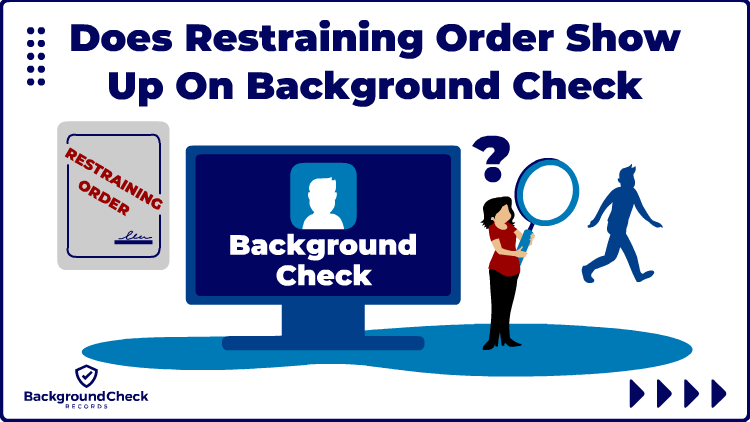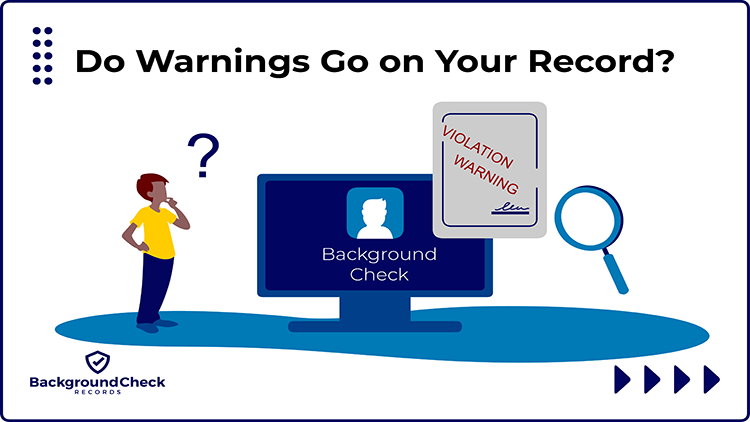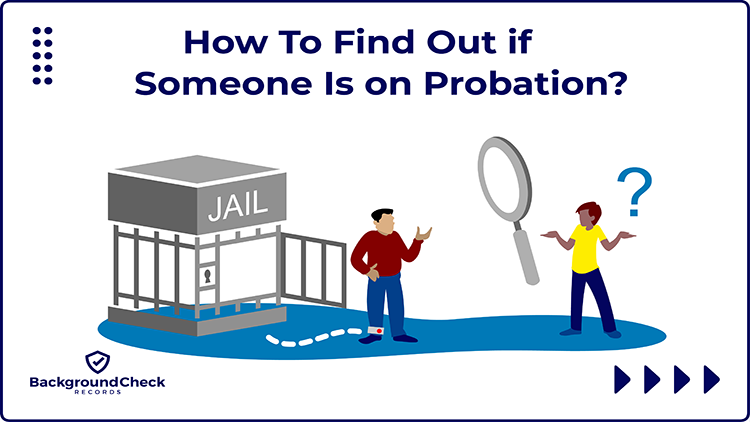Does Restraining Order Show Up on Background Check? Search Yours Free
One question a person may ask is whether a restraining order shows up on a background check or is part of public records.
A restraining order has a major impact on a person’s life and if it’s shown on a background check this can impact employment, housing, purchasing a firearm, obtaining an occupational license and more.
So search your record for free by filling out the form which will show whether or not the restraining is on your background check report.
For those who don’t want instance access or simply want more information, understanding the intricacies of how long restraining orders last, what can be shown on background checks in various states, the different types of background checks it may be shown on and how expired or dismissed restraining orders are handled are of utmost importance someone may have a background check done on them.
Restraining Orders and Your Record: What You Need To Know
While restraining orders are civil court actions, that does not mean they don’t affect a person’s life outside the relationship that resulted in issuance of an order.
An individual petitions the court to request a person be ordered to cease certain contact that is deemed harassment, intimate partner violence, or otherwise a danger to another, and when an order is issued, it becomes public record.
Whether a restraining order shows up on background check reports depends on the type of restraining order issued and state regulations.
There are different types of restraining orders that can be entered including a generic restraining order, a domestic violence protective order (sometimes referred to as personal protective order) or a no-contact order.
Commanders in the United States military also have the option to enter a military protective order which is enforceable on any military base.1
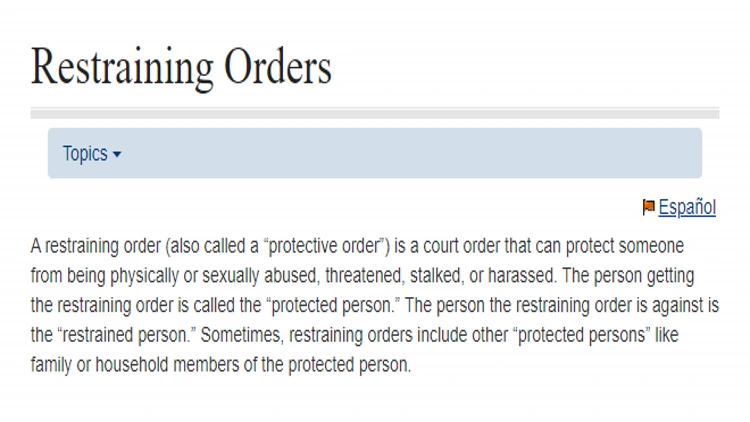
Restraining orders can be temporary or emergency orders (meaning they are valid for a short amount of time, typically a 30 day restraining order) or permanent orders (meaning they are valid for a longer time frame, typically one to two years, but can be up to five years).2
Additionally, bond conditions when a person is charged with a criminal offense and is released pre-trial can act as a restraining order if the conditions specifically state no contact with the victim in the crime.
A restraining order can prevent an individual from obtaining employment, housing, licensure or from being in certain locations as outlined in the order.
It can also prevent the individual from purchasing or possessing a firearm or from seeking a career where a firearm is used in the course of the work such as law enforcement, corrections or the military.
Do Restraining Orders Stay On Your Record?
A restraining order does go on your record. A restraining order is a court document; therefore, it is considered a public record. Even when the order expires, the original order is searchable at the clerk of court’s office in the jurisdiction where the order was entered.3
Thanks to the Full Faith and Credit Clause in Article IV of the Constitution, restraining orders issued in one state can become part of the record in another state if the victim moves to another state and registers their existing, valid protective order with the court in their new state of residence.
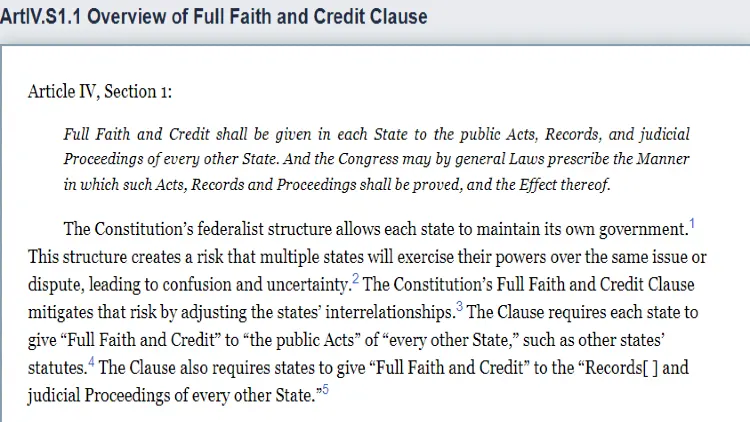
Protective orders are entered into the National Crime Information Center-Protective Order Submissions for search by law enforcement agencies. This information is also forwarded to the National Instant Criminal Background Check System for use in determining firearms permits.
Per federal law, individuals subject to a protective order are prohibited from purchasing or possession of a firearm, and the NICS check will flag anyone who has a restraining order on their record.4
While a restraining order does go on a person’s record, whether it shows up on background check reports depends on the level of the check, the type of screening, and the amount of information requested by the person needing the information.
Do Restraining Orders Appear On Background Check Reports? What Are The Laws In Your State?
For the most part, a restraining order can show up on a background check since it is considered public record, but whether it shows up or not depends on the type of screening and the state in which the background check is completed. State laws dictate when a background check can include protective orders.
Some states maintain an online registry of protective orders that can be searched by the public as well. For instance, an Indiana background check may encompass a complimentary online search for protective and restraining orders issued by the Indiana court system.
An Arkansas background check may also incorporate a no-cost online search of domestic violence court records via Arkansas Court Connect to include in the screening report.
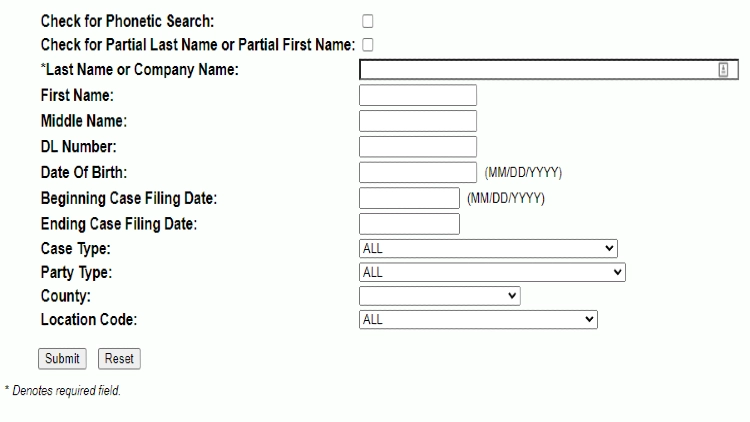
The table below outlines state statute regarding background checks and restraining orders in each state where the defendant’s information is public record and can appear on a background check:
*Pertains to orders issued, not cases where orders were denied or the matter was dismissed.
Background checks do show out of state restraining orders. They can show up for certain types of background checks or if the searcher is looking at national records for a deep dive.
Once the order is entered by a judge, it becomes public record regarding the defendant (the person who is subject to restrictions in the order), and this information can and does appear on certain background reports.
Emergency Restraining Orders: Do Temporary Restraining Orders Appear On a Background Check? How Long Does It Take to Show Up?
Emergency orders or temporary orders are issued before the defendant has been served, so they generally do not show up on a background check because they are short-term in nature.
Permanent orders are more likely to show up on a record screening. If an order (temporary or permanent) is denied, it can be expunged from the person’s permanent record and will not appear on a background check.5
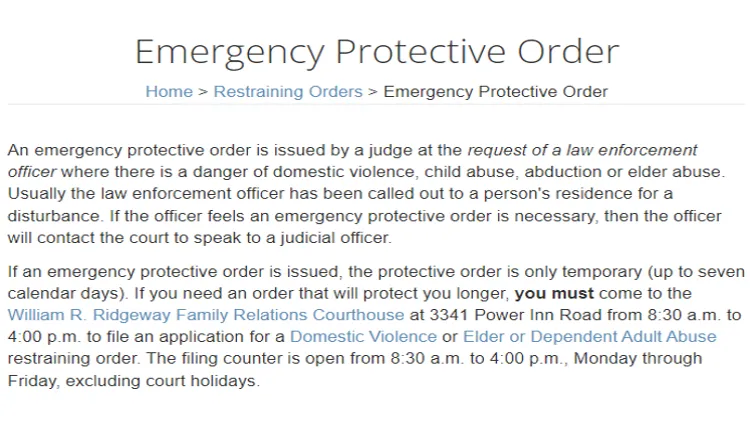
Once a permanent order has been issued it becomes public court record and can appear on a background check completed after the issuance of the order. Depending on the system the court uses to update court records will determine how quickly it appears in background search engines.
Even though restraining orders are issued in civil court, due to their nature, they can be part of a criminal background check and show up on a pre-employment or ongoing employment screening for the defendant in the action.
No contact orders are another type of restraining orders, and these can appear on employment checks as well. Usually, violations of these orders are considered criminal offenses that also show up on background checks.6
Does a PPO (Personal Protective Order) Show Up On a Background Check? Level 1 Check? Level 2 Check? What Types Of Screenings Reveal Restraining Orders?
A personal protective order might appear on level 1 background checks, although it’s unlikely since these checks primarily focus on criminal history rather than civil actions. However, because this search is name-based, it’s crucial to ensure that the information retrieved pertains accurately to the individual being screened.
On the other hand, a level 2 background check is fingerprint-based and is more likely to reveal if someone has a restraining order issued against them, depending on the depth of the search conducted.7
A level 3 background check and a level 4 background check involve thorough examinations of a person’s background, thereby disclosing court-ordered no-contact orders.
Firearms background checks will reveal if a person has an active protective order against them pursuant to The Brady Act which prohibits someone from purchasing or possessing a firearm if they are subject to a protective order.
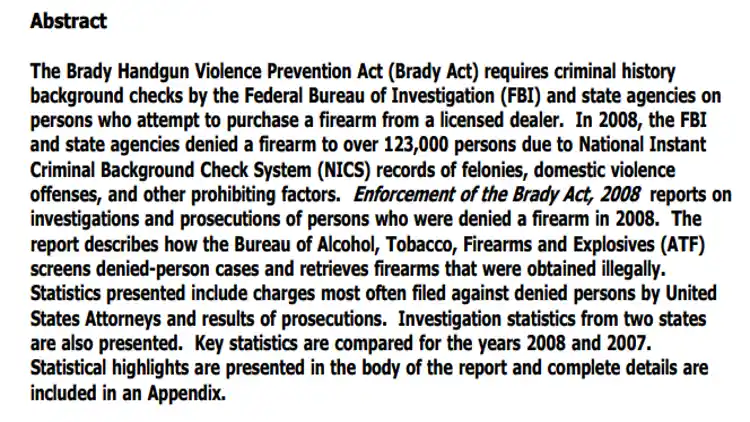
Screenings for security clearance or positions that require a person to carry a firearm in the performance of job duties will show if a person has an active restraining order against them.
Those performing marriage background checks should check court records to ensure the person they plan to marry does not have an active restraining order. This information can typically be found at the clerk of court’s office in the individual’s residential area.
Tenant screenings may or may not reveal if a person has a restraining order against them. Since most tenant screenings focus more on credit history and employment verification, it is not as likely a restraining order will appear.
Tenant screenings that include criminal history can reveal a person has an active restraining order against them. If a person is denied a rental because of the background report, the landlord or property manager must notify them in writing why they were denied per the Fair Credit Reporting Act.8
Expired, Dismissed, Or Denied Restraining Orders: How Does This Affect a Background Screening?
Expired, dismissed or denied restraining orders are still part of the court record, meaning they are public record; however, this does not mean they will necessarily show up on a background check.
When they do appear on a person’s background report, it will show the order was not entered by either being dismissed or denied, or that the order has expired and is no longer valid.
Can An Expired Restraining Order Prevent You From Purchasing a Firearm? Expired Restraining Order (Gun Background Check Laws Explained)
Federal laws prohibiting someone from purchasing a firearm applies to those with active protective orders, not expired ones. Per 18 United States Code 922(g)8 an expired restraining order can appear on a gun background check.
However, it cannot be used to deny a purchase unless there are other disqualifiers on the person’s record such as conviction for a misdemeanor domestic violence crime or pending criminal charges.9
Depending on the type of background check being conducted, being subject to a restraining order or protective order can be stressful. A person can search their record for free to find out whether a restraining order shows up on their background check reports.
Frequently Asked Questions
When Do Restraining Orders Appear On Background Check Reports?
Restraining orders are court documents which are public record and can appear on background check reports that require a deep dive into a person’s history. These include firearms background checks, security clearance, or other extensive employment checks that look at court records in addition to criminal history.
Can A Restraining Order Prevent You From Getting A Job Or Current Employment?
Yes, a restraining order can prevent a person from getting a job, or can lead to termination of a current employee when an order is issued by a judge; however, this is most likely to occur in jobs that involve public safety (such as law enforcement or corrections), or working with vulnerable populations. Some churches will also bar someone from ministry work when they are subject to a protective order.
Do Military Protective Orders Show Up On Background Checks?
Yes, they can appear on firearms background checks or employment screenings as part of the person’s service record.
1 MILITARY PROTECTIVE ORDERS FACT SHEET. (2022, March 1). Fort Benning. Retrieved November 15, 2022, from <https://www.benning.army.mil/MCOE/SJA/content/PDF/MPO%20FACT%20SHEET%20-%20March%202022.pdf>
2 What types of protective orders are there? How long do they last? (2022, February 14). WomensLaw.org. Retrieved November 15, 2022, from <https://www.womenslaw.org/laws/nc/restraining-orders/domestic-violence-protective-orders-50b-orders/basic-info/what-types>
3 Are Restraining Orders a Public Record? (2022, August 24). Shouse Law Group. Retrieved November 15, 2022, from <https://www.shouselaw.com/ca/blog/are-restraining-orders-public-record/>
4 U.S. Department of Justice Federal Bureau of Investigation Criminal Justice Information Services Division National Instant Crimi. (n.d.). FBI. Retrieved November 15, 2022, from <https://www.fbi.gov/file-repository/2010-nics-ops-report-4-19-11-1.pdf>
5 How Restraining Orders Impact Your Life, Record. (2019, March 13). Husker Law. Retrieved November 15, 2022, from <https://www.huskerlaw.com/blog/2019/03/how-restraining-orders-impact-your-life-record/>
6 Does a Restraining Order Appear on a Background Check? (2020, September 17). Baxter Harder, LLC. Retrieved November 15, 2022, from <https://www.baxterharder.com/blog/2020/september/does-a-restraining-order-appear-on-a-background-/>
7 Cleaves, M. D. (2021, January 11). Do protective orders show up on background checks? | The Law Office of Michael D. Cleaves, PLLC. Statesville Personal Injury Lawyer | Criminal Defense Attorney. Retrieved November 15, 2022, from <https://www.cleaveslawfirm.com/blog/2021/01/do-protective-orders-show-up-on-background-checks/>
8 What should I know about tenant screening when applying for rental housing? (2021, July 1). Consumer Financial Protection Bureau. Retrieved November 15, 2022, from <https://www.consumerfinance.gov/ask-cfpb/what-should-i-know-about-tenant-screening-when-applying-for-rental-housing-en-2103/>
9 Domestic Violence & Firearms. (n.d.). Giffords. Retrieved November 15, 2022, from <https://giffords.org/lawcenter/gun-laws/policy-areas/who-can-have-a-gun/domestic-violence-firearms/>

